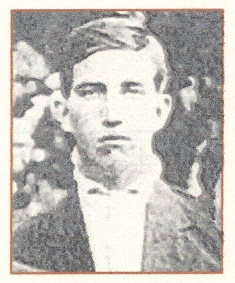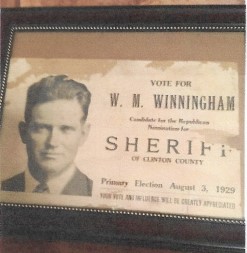The Winningham family of Kentucky and Tennessee was steeped in law enforcement history and in tragedy.
On April 21, 1933, Sheriff George Winningham and his son, Deputy Sheriff John Floyd Winningham, of Pickett County, Tennessee, responded to a report that three men had been killed in a fight at Rock Creek. The Sheriff and his son had been summoned at about 8 p.m. to the scene, called there following the near-fatal beating of a man, and as as they arrived, they were fired upon by men hiding in a railroad box car. The pair had been warned that Jerome, in particular, was a “bad man.” Deputy Sheriff Winningham died immediately and his

father, who was shot in the stomach by a .45 caliber round, was not expected to survive. The Sheriff was transported to Nashville and received several blood transfusions, but died the following day. Another deputy present was able to take three suspects into custody: Walter Crabtree (Charles’ brother), Lige Terry and Eugene Boyett, the deaf-mute brother of Jerome. Walter Crabtree named Jerome, a local bootlegger, as the shooter. He knew nothing, he claimed, of Boyett’s attack on his elderly uncle, Andrew, which was the purported reason for the call to Sheriff Winningham. It was thought that the aged man was supposed to have money, the motive for the attack. Other men leaped from the car and fled into the woods.
The scene of the tragedy was some 23 miles away from Byrdstown, in the mountains at a lumber company camp. Boyett, however, lived in adjacent Scott County, Tennessee.
Immediately, law enforcement, along with a posse of deputized citizens led by a local attorney, on both sides of the state line, with the counties of Pickett, Putnam, Overton and Fentress, to the south, in Tennessee, and Clinton, Wayne and McCreary Counties, in Kentucky, to the north, spreading out to locate more suspects. The Tennessee Highway Patrol and the Tennessee National Guard also provided help. One of those searching would have been the son and brother of the Tennessee men, Clinton County, Kentucky, Sheriff Willie M. Winningham. The posse sought Jerome and Ted Boyett, using bloodhounds that were hot on their trail.

Deputy John Floyd Winningham’s body was transported from Livingston to Byrdstown. He was survived by a wife, Mary, and two children, George and Peggy. He had served in the World War and in addition to his role of deputy sheriff, was also the jailer. He was well thought of in Byrdstown, where he made his home and served his county with his father, and the town was aroused to a high pitch over his murder.
On April 24, a mass meeting was held in Byrdstown, and some $250 was contributed as a dead or alive reward for the killers. They money, it was said, would also be used to defend any member of the posse who was not an officer should he kill any of the suspects. Some 350 attended at the courthouse; the occasion was orderly and presided over by the County Judge, J. I. Robbins. It was rumored that the two suspects, Jerome and Ted Boyett were already in custody and had been spirited away for safekeeping. In fact, Jerome, had not been captured as yet.

Both father and son were buried on April 24, laid to rest in the Cope Cemetery. The cemetery is located in Boom, the community where both men were raised and had many relatives. Sheriff Winningham, at 60, was said to be a leader of the county, and was serving his seventh term as county sheriff. It was noted that as the county temporarily lacked a coroner, Pickett County was left with neither a Sheriff or a Coroner to act as Sheriff. The double law enforcement funeral was said to be the “most impressive funeral ever seen in the Upper Cumberland.” Citizens came from all over the area and it was estimated that 2,500 were in attendance. The services were held on the front law of Sheriff Winningham’s home and the two men were laid in adjacent graves. During the service, the hat was passed for more reward money.
Unlike his father’s gravestone, no room was left for Deputy Winningham’s spouse, likely due to her younger age and the  likelihood she might remarry. His father’s stone had space for his wife, Martha, however. And in fact, although Mary Winningham did remarry and died many years later, her own gravestone in Kentucky bears both the Winningham name and the last name of her second husband. (Her second husband survived her and was buried beside his first wife.)
likelihood she might remarry. His father’s stone had space for his wife, Martha, however. And in fact, although Mary Winningham did remarry and died many years later, her own gravestone in Kentucky bears both the Winningham name and the last name of her second husband. (Her second husband survived her and was buried beside his first wife.) 
A few days later, it was announced that the sheriff’s widow, Martha, would succeed her husband briefly, until the county court could meet and choose someone to complete her husband’s term.

Several weeks later, on May 14, Ransom Boyett, Jerome’s father, was found dead at his Scott County, Tennessee, home, having suffered a broken neck. He had been held in custody, briefly, accused of helping his son escape, and it was understood that he had promised he would cause his son to surrender to the authorities in exchange for the reward, now amounting to $500.
Just a week later, on May 22, Deputy Sheriff Bailey King arrested Jerome Boyett in Scott County Tennessee, He was held in Huntsville, pending a return to Byrdstown, the county seat of Pickett County for prosecution. He reportedly confessed to killing the Winninghams, but

denied having had anything to do with his father’s death. However, late on the evening of June 8, just prior to his return, he and another man were seized by a group of 25 armed, masked men from the Scott County Jail. Sheriff Esau Laxton said that the men had struck the jailer, took his keys, locked him in a cell and dragged the two prisoners outside. They had cut the telephone line. Sheriff Laxton said none of the men were recognized. A cellmate stated that three men told the two prisoners that they were being taken out to escape a mob, and Winchester, at least, believed them. Boyett, however, “squealed like a rabbit.” They were handcuffed together and hauled down the steps.
The other man, Harvey Winchester, also in custody for a double murder, was soon found beside a lonely county road, between Huntsville and Helenwood, riddled with bullets. He was fully dressed but near his body was found a plow line rope with a noose. As he had bruises around his neck, it was though he was forced to run in circles while the mob fired upon him. Some 40 yards away, in bushes, Boyett’s stripped body was found; he had been shot seven times, mostly in the back. Sheriff Laxton promised a full investigation. Despite that, however, there is no indication that anyone was ever charged for the lynchings. (Despite the fact that the term lynching normally denotes a hanging, any extra-judicial murder by a mob, without a legal trial, no matter the means, is deemed a lynching.)
On July 31, 1933, just months after the death of his father and brother, Clinton County Sheriff Willie McKinley Winningham went to the home of Reed Cox, some 7 miles outside

Albany, the county seat. He held a warrant for an assault, charging Cox, a known drunkard, with having fired on another man earlier that same day. As Sheriff Winningham mounted the steps to the porch that evening, he was struck by gunshots coming from within the darkened home. Despite mortal injuries, he returned fire. A group of citizens in nearby Highway found the Sheriff on the porch, dying, and Cox dead inside the home with two gunshot wounds.

Sheriff Willie Winningham had been elected in 1929 and was, at the time, in an election campaign for County Court Clerk. (At the time, Kentucky sheriffs could not succeed themselves.) He was survived by his widow, Anne Pauline, and two daughters Rosalind and Chrystell, both teenagers. Like her mother-in-law, Anne Winningham was appointed Sheriff to complete her husband’s term. Unlike Martha Winningham, who served for only about a week, she served until the scheduled election, some six months later.
As a final, sad note, Sheriff Willie Winningham’s 12-year old daughter, Chrystell, passed on on December 24, 1933 from typhoid fever and heart failure. Sheriff Winningham, his daughter and his wife, who died many years later, all lie together in the Albany Cemetery (Albany, Kentucky).
The author expresses gratitude to Constable Gilbert Daniel, Clinton County, for his valuable assistance in this story.




